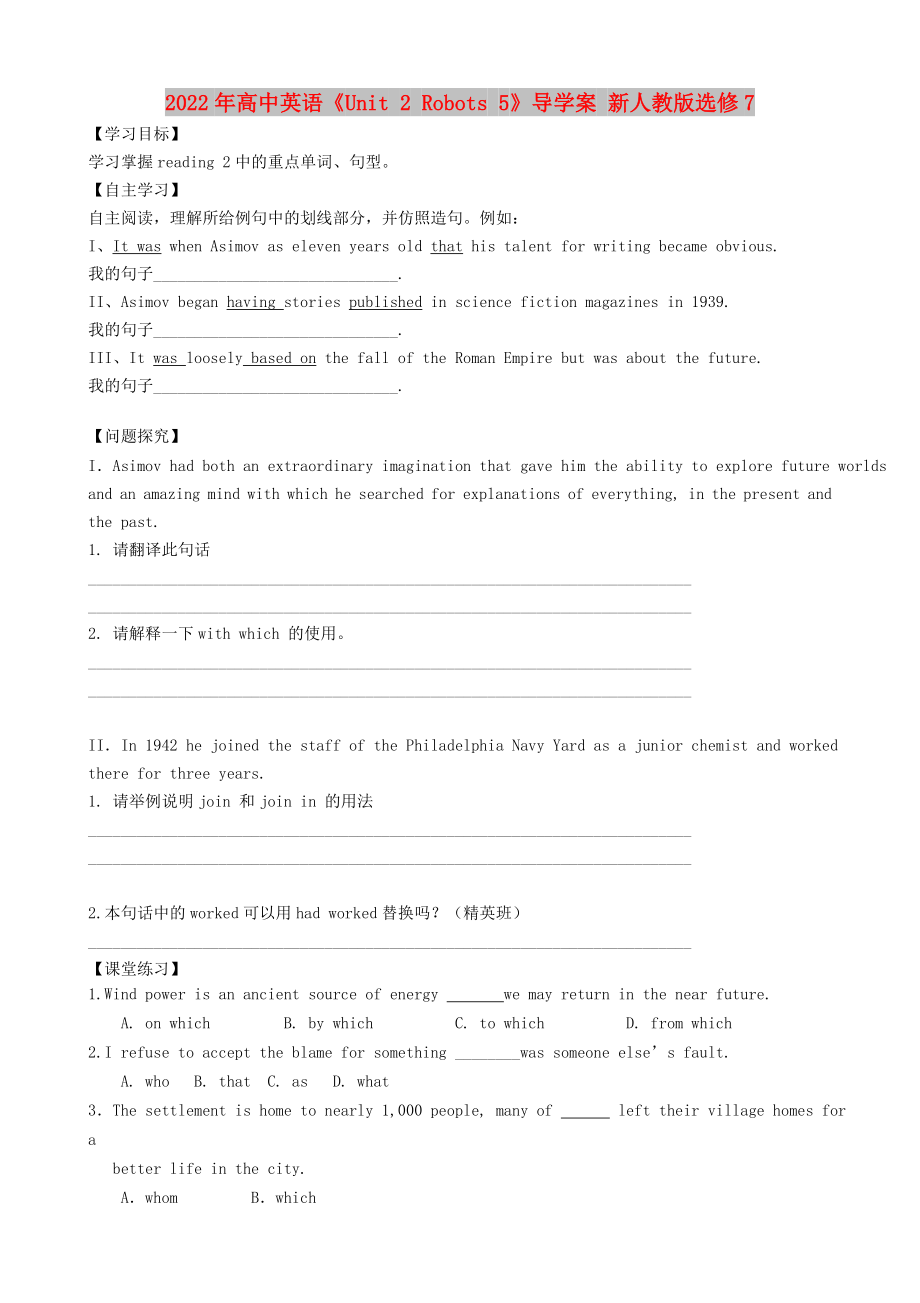《2022年高中英語(yǔ)《Unit 2 Robots 5》導(dǎo)學(xué)案 新人教版選修7》由會(huì)員分享,可在線(xiàn)閱讀����,更多相關(guān)《2022年高中英語(yǔ)《Unit 2 Robots 5》導(dǎo)學(xué)案 新人教版選修7(3頁(yè)珍藏版)》請(qǐng)?jiān)谘b配圖網(wǎng)上搜索。
1����、2022年高中英語(yǔ)《Unit 2 Robots 5》導(dǎo)學(xué)案 新人教版選修7
【學(xué)習(xí)目標(biāo)】
學(xué)習(xí)掌握reading 2中的重點(diǎn)單詞、句型����。
【自主學(xué)習(xí)】
自主閱讀,理解所給例句中的劃線(xiàn)部分����,并仿照造句����。例如:
I����、It was when Asimov as eleven years old that his talent for writing became obvious.
我的句子______________________________.
II、Asimov began having stories published in science fiction magazin
2����、es in 1939.
我的句子______________________________.
III、It was loosely based on the fall of the Roman Empire but was about the future.
我的句子______________________________.
【問(wèn)題探究】
I.Asimov had both an extraordinary imagination that gave him the ability to explore future worlds and an amazing mind w
3����、ith which he searched for explanations of everything, in the present and the past.
1. 請(qǐng)翻譯此句話(huà)
__________________________________________________________________________
__________________________________________________________________________
2. 請(qǐng)解釋一下with which 的使用。
___________________________
4����、_______________________________________________
__________________________________________________________________________
II.In 1942 he joined the staff of the Philadelphia Navy Yard as a junior chemist and worked there for three years.
1. 請(qǐng)舉例說(shuō)明join 和join in 的用法
_____________________________
5����、_____________________________________________
__________________________________________________________________________
2.本句話(huà)中的worked可以用had worked替換嗎?(精英班)
__________________________________________________________________________
【課堂練習(xí)】
1.Wind power is an ancient source of energy we
6����、may return in the near future.
A. on which B. by which C. to which D. from which
2.I refuse to accept the blame for something ________was someone else’s fault.
A. who B. that C. as D. what
3.The settlement is home to nearly 1,000 people, many of left their
7����、 village homes for a
better life in the city.
A.whom B.which
C.them D.those
4.It was from only a few supplies that she had bought in the village _______ the hostess cooked
such a nice dinner.
A. where B. that C. when D. which
5.John's success has nothing to do wit
8����、h good luck. It is years of hard work has made him what he is today.
A. why B. when C. which D. that 6. It was _____ he came back from Africa that wear _________ he met the girl he would like to marry.
A. when; then B. not; until C. not
9、until; that D. only; when
7.It was in New Zealand Elizabeth first met Mr.Smith.
A.that B.how C.which D.when
8. Alexander tried to get his work _______in the medical circles.
A. to recognize B. recognizing C. recognize D. recognized
9. With Father’s Day aro
10����、und the corner ,I have taken some money out of the
bank ______ presents for my dad.
A. buy B. to buy C. buying D. to have bought
10. When he the door, he found his keys were nowhere.
A. would open B. opened C. had opened D. was to open
Period 5
【課堂練習(xí)】
1.答案:C
考點(diǎn):此處考
11、查的是介詞加疑問(wèn)詞引導(dǎo)從句
解析:考察介詞+which的用法����。=Wind power is an ancient source of energy which\that we may return to in the near future.
2.答案:B
考點(diǎn):定語(yǔ)從句。
解析:不定代詞something作主語(yǔ)����,用that引導(dǎo)。
3.答案:A 考點(diǎn):本題考查定語(yǔ)從句引導(dǎo)詞����。解析:由many之后的逗號(hào)和選項(xiàng)特征,此處是主從句關(guān)系����,排除C����、D項(xiàng)����。由于先行詞是“1,000 people”,表示人����,故用whom。句意為:這里居住著將近1000人����,他們中的許多人都背井離鄉(xiāng)去城市追求更好的
12、生活����。
4.答案:B.
考點(diǎn):本題考查強(qiáng)調(diào)句型。
解析:迷惑點(diǎn)在于強(qiáng)調(diào)部分中含有一個(gè)定語(yǔ)從句that she had bought in the village����。
5.答案:D
考點(diǎn):考查強(qiáng)調(diào)句型����。
解析:題干為強(qiáng)調(diào)句型����,被強(qiáng)調(diào)部分為years of hard work����,故選D項(xiàng)。
6.答案 C
解析 強(qiáng)調(diào)句型����。根據(jù)It is ……that 結(jié)構(gòu)可知。
7.答案 A
解析 句意為:正是在新西蘭伊麗莎白第一次見(jiàn)到史密斯先生����。It+be+被強(qiáng)調(diào)成分+that句型為強(qiáng)調(diào)句。
8.答案:D
句意:亞歷山大試圖讓他的工作在醫(yī)學(xué)圈內(nèi)得到認(rèn)可����。
解析:考查非謂語(yǔ)動(dòng)詞用法。賓語(yǔ)work和recognize之間存在被動(dòng)關(guān)系����,所以用過(guò)去分詞作賓語(yǔ)補(bǔ)足語(yǔ)。
9.答案:B
句意:父親節(jié)將要到來(lái)����,為了給爸爸買(mǎi)禮物我已經(jīng)從銀行取了一些錢(qián)����。
解答:根據(jù)選項(xiàng)此題考察非謂語(yǔ)動(dòng)詞����。題干中空格劃在名詞后,但是空格后的部分不是對(duì)bank解釋說(shuō)明����,而是說(shuō)明取錢(qián)的目的,因此此題中非謂語(yǔ)動(dòng)詞做目的狀語(yǔ)����,非謂語(yǔ)動(dòng)詞中不定式做狀語(yǔ)用來(lái)表示目的,因此選擇B����。
10.答案 D
解析 考查非謂語(yǔ)動(dòng)詞。動(dòng)詞不定時(shí)的用法����。句意為:當(dāng)他要打開(kāi)門(mén)的時(shí)候,他發(fā)現(xiàn)他的鑰匙不見(jiàn)了。動(dòng)詞不定時(shí)表示將要發(fā)生的動(dòng)作。
 2022年高中英語(yǔ)《Unit 2 Robots 5》導(dǎo)學(xué)案 新人教版選修7
2022年高中英語(yǔ)《Unit 2 Robots 5》導(dǎo)學(xué)案 新人教版選修7

